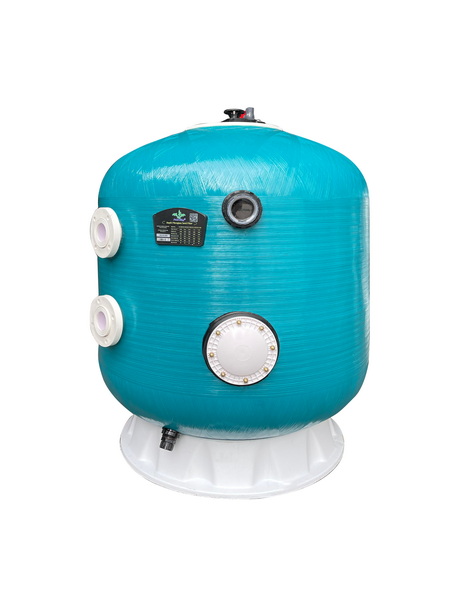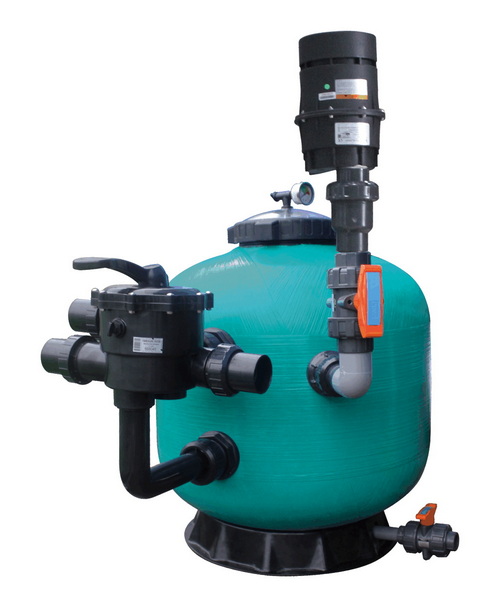Views: 222 Author: Tina Publish Time: 2025-10-20 Origin: Site








Content Menu
>> 2. DE (Diatomaceous Earth) Filters
● How Often Should You Clean Your Pool Filter?
>> Sand Filters
>> DE Filters
● Signs Your Pool Filter Needs Cleaning
● Tips for Proper Pool Filter Maintenance
● Benefits of Timely Pool Filter Cleaning
● Frequently Asked Questions (FAQs)
>> 1. How do I know when my pool filter needs cleaning?
>> 2. Can I clean the pool filter too often?
>> 3. What happens if I don't clean my pool filter?
>> 4. Are there any eco-friendly methods for cleaning pool filters?
>> 5. Can household chemicals be used to clean pool filters?
Maintaining a clean and efficient pool filter is essential for keeping your swimming pool water clean, clear, and safe. A properly functioning filter removes dirt, debris, and contaminants, ensuring a healthy swimming environment. In this comprehensive guide, we'll explore the importance of pool filter cleaning, the different types of filters, how often you should clean each type, and tips to maximize filter performance.

Before discussing cleaning frequency, it's important to understand the main types of pool filters:
Sand filters use a bed of special sand to trap dirt and debris as water passes through. They are popular for their simplicity and durability. The sand media provides excellent mechanical filtration, capturing large particles effectively. However, over time, the sand can become worn or clogged with oils, minerals, and debris, reducing the filter's efficiency.
DE filters use a powder made from fossilized remains of diatoms to coat filter grids. They offer the finest filtration among all types, trapping very small particles down to 2-5 microns. DE filters require regular backwashing to rinse away trapped dirt and periodic recharging with fresh powder. Due to their detailed filtration ability, these filters tend to produce the clearest pool water.
Cartridge filters employ a pleated fabric cartridge to trap dirt and debris. They require less water for cleaning than sand and DE filters because cleaning involves removing and hosing off the cartridges rather than backwashing. Cartridge filters are popular for their easy maintenance and energy efficiency, although the cartridges have a limited lifespan and must be replaced when worn or damaged.
You should backwash your sand filter every 1-2 weeks or whenever the pressure gauge reads 8-10 psi higher than the starting pressure after a cleaning. Backwashing reverses the water flow and flushes trapped dirt out of the sand media. Regular backwashing prevents clogging and maintains good water circulation.
Every 3 to 5 years, it's advisable to replace the sand in your filter as the grains wear down and lose their filtering power. Some owners also perform a deep cleaning of the sand with special cleaner products to remove oils and scale buildup between replacements.
Backwash and recharge the DE powder regularly whenever the pressure gauge rises about 8-10 psi above the clean pressure level. Unlike sand filters, DE filters rely on clean, fresh DE powder coating the grids to trap fine particles effectively.
A thorough grid cleaning should be performed every 3-5 months. This involves removing the grids and washing off built-up dirt and powder residues with water and specialized filter cleaners. Timely cleaning ensures the grids remain effective and prolongs the system's life.
Cartridge filters mainly require cleaning every 2-6 weeks depending on the pool usage and water quality. To clean, remove the cartridges and hose down both sides thoroughly to remove dirt, leaves, and oils.
Cartridge filters typically require replacement every 1-2 years or sooner if fabric damage or permanent staining occurs. Using cartridge cleaner solutions periodically helps to remove grease, oils, and scale from the pleats to maintain filtering capacity.

Knowing when to clean your pool filter is critical. Watch for these indicators:
- Increased pressure on the gauge: A spike of 8-10 psi above the normal starting level means the filter media is clogged.
- Reduced water flow: Slower return jets can signal a clogged or dirty filter.
- Cloudy or murky pool water: Ineffective filtering causes particles to remain suspended.
- Unusual noises or odors: Gurgling sounds or chemical smells may indicate malfunctioning or dirty filters.
- Frequent pump cycling: The pump working harder could mean the filter is obstructed.
- Monitor filter pressure regularly: Keep a pressure gauge on the filter and check it at least once a week.
- Backwash promptly: Whenever pressure builds up, backwash to release trapped debris.
- Rinse cartridge filters thoroughly: Remove cartridges and spray them clean with a high-pressure hose.
- Use specialized filter cleaners: Apply filter cleaning products to remove oils, minerals, and scale buildup.
- Inspect and maintain pump parts: Check seals and O-rings, and lubricate fittings to avoid leaks.
- Winterize your filter: Before winter, clean the filter thoroughly, drain all water, and cover it to protect from freezing damage.
- Follow manufacturer guidelines: Each filter type and brand may have specific care instructions—adhere closely to avoid voiding warranties.
Keeping your pool filter clean on schedule offers multiple benefits:
- Maintains crystal-clear pool water: Proper filtration removes dirt, algae, and bacteria efficiently.
- Increases equipment longevity: Clean filters reduce wear and tear on pumps and other parts.
- Improves energy efficiency: A clean filter lowers pump strain, reducing electricity usage and costs.
- Prevents expensive breakdowns: Avoids damage from clogged filters, which can lead to system failures.
- Ensures safer swimming conditions: Effective filtration reduces harmful pathogens and keeps water balanced.
Regular cleaning and maintenance of your pool filter are indispensable for a healthy, sparkling pool. Whether you have a sand, DE, or cartridge filter, understanding the specific cleaning schedule and care requirements for your filter type will ensure optimal performance. Timely cleaning helps maintain clear water, extends filter lifespan, saves energy, and prevents costly repairs. Integrate routine filter inspections and cleanings into your pool care regimen, and your pool will remain inviting and refreshing all season long.

Check the pressure gauge on your filter regularly. A rise of 8-10 psi above the clean starting pressure means it's time to clean or backwash the filter media.
Cleaning too frequently generally isn't harmful but can waste water and cleaning supplies. Follow manufacturer guidelines and clean based on pressure readings and water clarity to optimize maintenance.
A dirty filter decreases water flow, causes cloudy water, increases energy consumption, stresses your pump, and can lead to costly damage or replacement of equipment.
Yes, using biodegradable filter cleaning solutions and capturing backwash water for reuse can reduce environmental impact.
Avoid using harsh household chemicals as they may damage filter materials. Always use cleaners specifically designed for pool filters.
This article introduces leading Pool Filter Valve Manufacturers and Suppliers in Japan and Asia, covering valve types, key Japanese pool brands, OEM opportunities, and application segments. It explains how advanced engineering, strict quality control, and strong visual marketing help exporters win global pool projects.
This article introduces the main types of Pool Filter Valve Manufacturers and Suppliers serving Russia, including local distributors, industrial filter producers, global brands, and Chinese OEM partners. It explains key selection criteria, product ranges, and OEM opportunities for Russian pool projects.<br />
This article introduces the leading Pool Filter Valve Manufacturers and Suppliers in Australia, explains common valve types and technical features, highlights major distributors and OEM opportunities, and offers practical tips for international buyers sourcing compatible filtration valves and systems.
This article introduces Italy’s leading Pool Filter Valve Manufacturers and Suppliers, detailing their technologies, materials, OEM services, and application scenarios. It explains how Italian valves integrate with sand, DE, and cartridge filters and why global brands choose Italian partners for premium pool filtration solutions.<br />
This article introduces the Portuguese market for pool filtration equipment and highlights how local specialists, European brands, and Chinese OEM Pool Filter Valve Manufacturers and Suppliers cooperate to serve residential and commercial pools, offering multiport valves, filters, pumps, and customized OEM solutions.<br />
This article explains whether you can safely use pool filter sand in an aquarium, covering sand types, preparation, pros and cons, plant and fish compatibility, maintenance tips, and alternatives. It helps hobbyists choose and manage substrate using pool-grade filtration media.
This article explains when to backwash a pool filter using pressure readings, water clarity and flow as guides. It covers sand and DE filter schedules, backwash steps, common mistakes, troubleshooting cloudy water, and how OEM sand filter systems can simplify maintenance for global pool owners.<br />
This article explains what pool filter balls are, how they work, and why they are an increasingly popular alternative to sand in residential pool filters. It covers benefits, installation, maintenance, compatibility, and OEM opportunities for brands seeking high‑performance filtration solutions.<br />
This article explains how often to change a pool filter cartridge, covering typical 1–3 year lifespans, signs of wear, and factors like usage, climate, and maintenance. It shows how cleaning frequency, pressure readings, and water clarity guide replacement and highlights the value of OEM cartridge solutions.
This article explains how often to change a pool filter cartridge, covering typical 1–3 year lifespans, factors that affect replacement timing, and clear signs of wear. It outlines cleaning versus replacement, residential vs commercial schedules, and highlights OEM cartridge solutions for complete pool filtration systems.<br />
Learn how to remove a stuck inground pool ladder step‑by‑step, from releasing anchor wedges and dissolving mineral buildup to using safe, controlled force and seasonal maintenance. Discover tools, safety tips, and prevention methods to protect your rails, anchors, and pool deck.<br />
This guide explains how to remove a corroded pool ladder step by step, from safety prep and penetrating oil to leverage, heat and cutting as a last resort. Learn how to clean and restore stainless steel, prevent future corrosion and decide when to replace the ladder for long‑term pool safety.<br />
Reinforce a pool ladder the right way with solid base leveling, secure deck anchors, safe weighting, better traction, and corrosion control. Learn practical DIY methods, maintenance tips, and safety standards to make above‑ground and in‑ground pool ladders sturdier and safer for every swimmer.<br /> <br />
This guide explains how to put up a pool ladder safely, covering ladder types, tools, and step‑by‑step installation for above‑ground and in‑ground pools. It also details stability tips, safety checks, maintenance advice, and multimedia ideas to help users install ladders with confidence.<br /> <br />
This in-depth guide shows how to put together a Vinyl Works pool ladder step by step, from sorting parts to final safety checks. It covers tools, ballast, handrails, mounting to pool or deck, gate installation, maintenance tips, and a clear FAQ to help owners assemble with confidence.<br />
Replacing a pool pump typically costs $300–$1,600, depending on pump type, size, and labor. Learn what affects pool pump replacement cost, the benefits of variable‑speed pumps, and how OEM pool equipment solutions help brands and distributors control price and quality.<br /> <br />
Learn how to wire a pool pump safely with the right voltage, breaker, wire size, GFCI protection, grounding, and bonding. Step‑by‑step guidance, testing tips, and FAQs help homeowners, installers, and OEM buyers ensure efficient, code‑compliant pool circulation systems.<br />
Learn how to replace a swimming pool pump motor step by step, from shutting off power and disassembling the pump to installing a new motor, wiring it safely, and testing for leaks. Ideal for DIY pool owners and OEM buyers seeking reliable filtration solutions.<br />
This in‑depth guide explains how to safely remove a motor from a pool pump, from shutting off power and draining the system to disconnecting wiring, separating the motor, and inspecting seals, while also highlighting OEM pool pump and filtration solutions for global brands.<br />
This article explains whether a pool pump must run all the time, how many hours per day are recommended, and how factors like filter type, climate, and variable speed pumps affect run schedules. It also highlights how a professional Chinese OEM factory supplies complete pump and filter solutions.<br />
